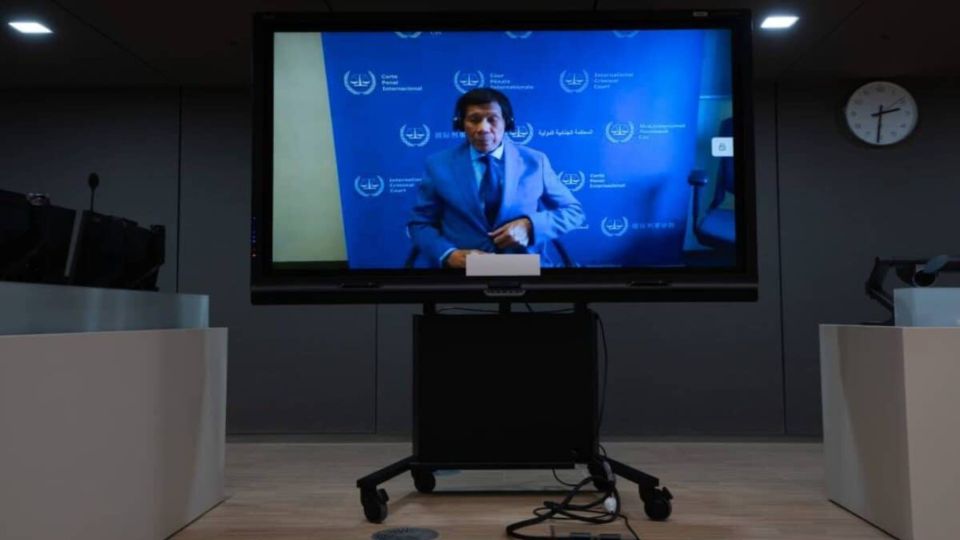September 23, 2025
MANILA – The International Criminal Court (ICC) has released the summary and details of the charges filed against former President Rodrigo Duterte.
In the public redacted version of “Document Containing the Charges,” uploaded in the Court’s website on Tuesday, Sept. 22, excerpts of the charges against Duterte were shown, specifically for murder and attempted murder committed during his time as Davao City mayor and later as President.
READ: Duterte lawyers bare first set of evidence to ICC, victims’ counsel
Based on the document, the prosecution held Duterte criminally liable for:
- Murder as a crime against humanity in Davao City between 2013 to 2016 during Duterte’s time as Davao City mayor — citing nine incidents which resulted in 19 victims
- Murder as a crime against humanity of “High-Value Targets” in locations across the Philippines during his term as president, between 2016 and 2017 — citing five incidents which resulted in 14 victims.
- Murder and attempted murder as crimes against humanity in barangay clearance operations in locations across the Philippines during his term as president, between 2016 and 2018 — citing 35 incidents which resulted in 45 victims (43 of whom were killed).
The prosecution then noted that the actual scale of victimization during the charged period “was significantly greater due to its widespread nature.”
According to the prosecution, Duterte was individually criminally responsible for indirect co-perpetration, ordering and/or inducing, as well as aiding and abetting crimes against humanity.
On indirect co-perpetration, the prosecution asserted that Duterte and his co-perpetrators shared a “Common Plan” or agreement to “neutralize” alleged criminals in the Philippines through violent crimes, including murder, between November 1, 2011, and March 16, 2019.
It alleged that during his time as mayor of Davao City and later as president, Duterte oversaw a network of police, local officials, and hired gunmen to kill suspected criminals, first through the Davao Death Squad (DDS) as the mayor, and later into a “National Network” as the president.
The prosecution asserted that Duterte controlled the chain of command, approved operations, and compelled obedience within the “Common Plan” through loyalty, debts, threats, and violence — with those who defied orders even risking their own deaths.
The former president’s alleged essential contributions to the “Common Plan” are as follows:
- Designing and disseminating the policy to ‘neutralise’ alleged criminals (both in his role as Mayor of Davao City, and also during his Presidential campaign and as President), including by endorsing the anti-illegal drugs campaign ‘Double Barrel’;
- Establishing and overseeing the DDS;
- Instructing and authorizing violent acts, including murder, to be committed against alleged criminals, including alleged drug dealers and users;
- Providing personnel and other necessary logistical resources, such as weapons, including those to be used in the execution of the crimes;
- Appointing key personnel to positions which were crucial to the execution of the crimes;
- Offering financial incentives and promotions to police officers and hitmen to kill alleged criminals;
- Creating and maintaining a system in which perpetrators knew they would be protected, including through promises of immunity and shielding perpetrators from investigation and prosecution;
- Making public statements authorizing, condoning, and encouraging killings of alleged criminals, both as Mayor of Davao City and president of the Philippines;
- Authorizing State actors to take part in the anti-drugs campaign and temporarily revoking such authorization, including to placate public outcry;
- Publicly naming individuals and holding up charts from lists of alleged criminals, including so-called “high-value targets”, some of whom were subsequently killed.
Meanwhile, several possible members of the common plan were identified, but their names were among the information redacted in the publicized document.
Duterte’s other individual criminal liabilities lie on the same assertion that he, as Davao City mayor and later as president, directly ordered and influenced members of the DDS and the “National Network” to carry out killings.
He was also accused of aiding and encouraging these killings by providing support and moral reinforcement to the perpetrators.
“Duterte meant to engage in the relevant conduct and did so with the purpose of facilitating the commission of such crimes,” the prosecution noted.
“Duterte was aware that members of the DDS and the National Network would, in the ordinary course of events, commit the types of crimes charged, and was aware that his conduct would contribute to their commission,” it added.
The original schedule of the confirmation of charges hearing against Duterte was supposed to be Tuesday, Sept. 23.
However, the hearing was reset due to a request made by Duterte’s defense on Aug. 18 for an “indefinite adjournment” of all legal proceedings, including the confirmation of charges hearings, based on its claim that Duterte is “not fit to stand trial.”
The request was granted, as the ICC Pre-Trial Chamber I voted for a “limited postponement” of the proceedings, with only one dissenting opinion.


